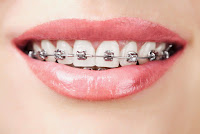 When it comes to braces, metal braces are the most commonly used. Metal braces involve brackets that are glued onto the front side of each individual tooth. You may have heard the words “self-ligating" when people talk about metal braces. Self-ligating is an innovative technology that uses high-tech, light-force wires to achieve tooth movement with less pressure on your teeth for more comfortable treatment.
When it comes to braces, metal braces are the most commonly used. Metal braces involve brackets that are glued onto the front side of each individual tooth. You may have heard the words “self-ligating" when people talk about metal braces. Self-ligating is an innovative technology that uses high-tech, light-force wires to achieve tooth movement with less pressure on your teeth for more comfortable treatment.
Like metal braces, ceramic braces are glued onto the front of each tooth but are crystal-clear and blend with the natural color of your teeth so they are not as visible as metal braces. They are made of a strong, polycrystaline alumina that is more comfortable on your lips and cheeks.
A series of alignment trays are created from molds and can be removed for brushing and flossing. Each aligner works to straighten your teeth in small incremental movements until the desired results are achieved. Clear Aligners are made of lightweight, clear plastic in the shape of your dental arches and are virtually invisible.
There are 2 basic types of braces patients can choose from, those that are attached to the teeth and those that are removable. The type of braces you will need will be dependent on your specific orthodontic problem. Because each individual’s case is different, Dr, Spannhake cannot use the same treatment or braces on every person. However, if you are considering orthodontic treatment and have a specific type of bracket in mind, don’t be afraid to voice your opinion. You never know what braces will be right for you until you ask.
To find out more about different options offered at Spannhake Orthodontics click here.


This is the type of information I’ve long been trying to find. Thank you for writing this information.
ReplyDeleteList of teeth Misalignments that Ceramic braces address